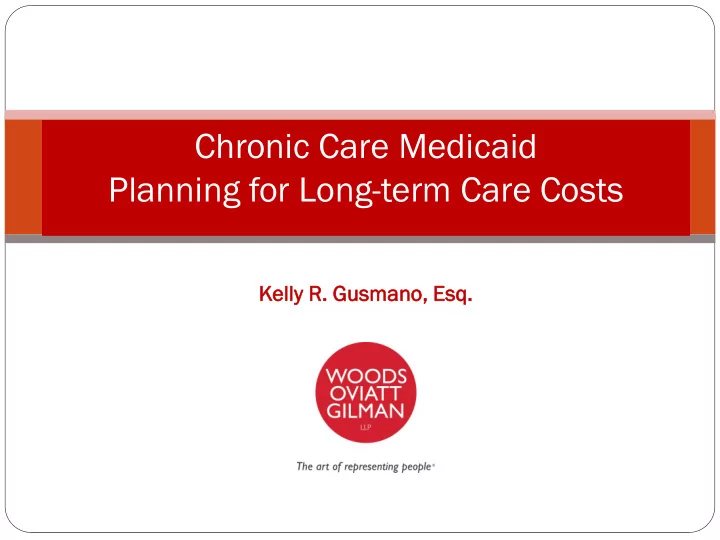

Chronic Care Medicaid Planning for Long-term Care Costs Kelly R. Gusmano ano, , Esq.
The Do e Docume cuments nts Ever eryone one Should uld Have Last Will and Testament Durable General Power of Attorney With a statutory gifts rider Living Will and Health Care Proxy Beneficiary Designation Forms
Changi ging g Cir ircums umsta tance nces Your estate plan may be set and your documents may be signed, but… Long-term care costs, such as nursing home room and board, assisted living facilities, and in-home aides, can substantially deplete your savings and alter your original estate plan!
Nursing Home Room & Board Nursing homes can range anywhere from $12,000 per month to $17,000 per month! Nursing Home
How do I pay for all of this??
Payment for Care Medicare and supplemental insurance plans will cover short- term rehab. Typically this coverage lasts 100 days (possibly with a co-pay after day 20), but this coverage could be cut at any time. Privately pay for care ($180,000 per year!) Long-term care insurance AND/OR Medicaid
Why Medicaid? We all pay into Medicaid and no one should have to become impoverished in order to pay for health care. Medicaid can reduce your monthly bill from $15,000 to $1,000 or $2,000 (more or less depending upon the applicant's monthly income) The ongoing payment to the nursing home is based upon an applicant's income, and, therefore, will continue to be affordable in perpetuity.
Medicaid Eligibility Requirements Resource limit of $15,750 Includes: bank accounts, stocks, bonds, mutual funds, other non-qualified investments, life insurance cash value Does not Include: house and adjoining property, life estates, one vehicle (provided it is in use), retirement funds (provided the applicant is receiving distributions), prepaid burial account No strict income limit (but must be less than monthly nursing home bill at the private pay rate)
What about the Five-year Lookback? One-month penalty for every $10,720 that is gifted within the prior 60 months before applying for Medicaid. It is never too late to engage in strategies to preserve assets, even when there has been prior gifting! We can plan to save assets even when someone is about to enter a nursing home. We do this by making use of exempt transfers. There is no penalty for transferring assets to a spouse or disabled/minor child.
Crisis Planning on Entry y to Nursing Home me Two Scenarios Spousal Gift and Married Single Refusal Plan Note Plan
Spo pousal al Ref efusa usal l Plan Jane Doe John Doe “Institutionalized Spouse” “Community Spouse” • $100,000 • $100,000 Must Be <$15,750 Jane Doe John Doe “Community Spouse” “Institutionalized Spouse” • $0 = Medicaid Eligible • $200,000
Spo pousal al Ref efusa usal l Plan Private Pay v. Medicaid Medicaid’s Rights to Reimbursement in Spousal Cases $16,000 Community Spouse entitled to first $14,000 ~$3,000 of marital income. $12,000 Medicaid may seek income contribution $10,000 from community spouse’s income in $8,000 excess of ~$3,000 $6,000 Medicaid may seek resource reimbursement from community spouse $4,000 where community spouse has more than $2,000 ~$75,000 $0 Private Pay Medicaid Patient Patient
Income ome-Stre tream am Plan Jane Doe Trusted Child “Community Spouse” • $74,820 • $125,180 loan, payable to Jane
Gif ift and N d Note e Plan Resources Gifts Income • $100,000 • Social Security • Pension Must Be <$15,750 Resources Gifts Income • $0 = Medicaid • $50,000 Gift to • Social Security Eligible beneficiaries under • Pension the Will • $50,000 Loan
Summar mary A basic estate plan provides fundamental protection and everyone should have the tools necessary to make sure their plan clear. Crisis Planning – Asset protection options exist even on entry to nursing home.
Questions?? Kelly R. Gusmano, Esq. Direct Dial: 585-987-2897 Direct Fax: 585-445-2397 kgusmano@woodsoviatt.com Firm Phone: 585-987-2800 Firm Fax: 585-454-3968 woodsoviatt.com 1900 Bausch & Lomb Place, Rochester, New York 14604
Recommend
More recommend